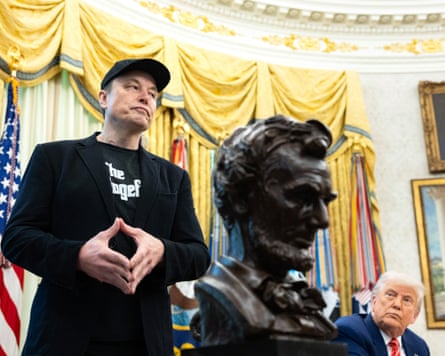The first and second Trump administrations have provoked markedly different critical reactions. The shock of 2016 and its aftermath saw a wave of liberal anxiety about the fate of objective knowledge, not only in the US but also in Britain, where the Brexit referendum that year had been won by a campaign that misrepresented key facts and figures. A rich lexicon soon arose to describe this epistemic breakdown. Oxford Dictionaries declared “post-truth” their 2016 word of the year; Merriam-Webster’s was “surreal”. The scourge of “fake news”, pumped out by online bots and Russian troll farms, suggested that the authority of professional journalism had been fatally damaged by the rise of social media. And when presidential counsellor Kellyanne Conway coined the phrase “alternative facts” a few days after Trump’s inauguration in early 2017, the mendacity of the incoming administration appeared to be all but official.
The truth panic had the unwelcome side-effect of emboldening those it sought to oppose. “Fake” was one of Trump’s favourite slap-downs, especially to news outlets that reported unwelcome facts about him and his associates. A booming Maga media further amplified the president’s lies and denials. The tools of liberal expertise appeared powerless to hold such brazen duplicity to account. A touchstone of the moment was the German-born writer and philosopher Hannah Arendt, who observed in her 1951 book The Origins of Totalitarianism that “the ideal subject of totalitarian rule is not the convinced Nazi or the dedicated communist, but people for whom the distinction between fact and fiction … no longer exists”.
In 2025, the denunciations have a different flavour. To many of us, the central problem is that we live not so much in a time of lies as one of stupidity. This diagnosis has credibility across the political spectrum. In January, the centrist columnist David Brooks wrote a column for the New York Times titled “The Six Principles of Stupidity”. The new administration, he wrote, was “behaving in a way that ignores the question: What would happen next?”
In March, Hillary Clinton – not, perhaps, ideal counsel – weighed in with an op-ed in the same paper, with the headline: “How Much Dumber Will This Get?” “It’s not the hypocrisy that bothers me,” Clinton wrote, “it’s the stupidity.” And in April, the Marxist writer and intellectual Richard Seymour posted an essay on “Stupidity as Historical Force”. In place of Arendt, Seymour quoted Trotsky: “When the political curve goes down, stupidity dominates social thinking” – once the forces of reaction predominate, so reason gives way to insults and prejudice.
Trump’s lying is no less constant or blatant than in 2016, but by now it feels familiar, already priced in. What more is there to say about the “war on truth” a decade into Trump’s political career?
Still, at least two aspects of his second administration are newly and undoubtedly “stupid”. One is shambolic incompetence of a degree that led the editor of the Atlantic magazine to be accidentally added to a Signal group chat about US military operations, a group whose other members included the vice-president and the secretary of defence. A second is its incomprehensible determination to press ahead with policies – such as tariffs and the defunding of medical research – that will do deep harm without any apparent gain, even for Trump’s backers and clients, still less his voters.
The spectacle of a prominent vaccine sceptic and wellness crank as secretary of health and human services goes beyond an abandonment of truth; it feels like an assault on human progress. Bans on fluoride in tap water, passed by legislators in Utah and Florida at Robert F Kennedy Jr’s behest, mark a new hostility to the very idea of evidence-based government. The escalation from Trump One to Trump Two has seen irrationality spread from the deliberative public sphere to flood the veins of government.
When we interpret the actions of others, a basic principle is to assume that people have reasons for behaving as they do, even if those reasons may be emotional, shortsighted or cynical. In the wake of the group chat fiasco and the tariffs upheaval, social media posters made a kind of parlour game of cramming the Trump administration’s actions into their favoured explanatory paradigm. Signalgate must have been deliberate; tariffs must be a grand plan to crash the dollar in the interest of one economic faction or another. The risk is that ever-more elaborate explanations for stupid actions end up wrongly according those actions a kind of intelligence – rather confirming the insight of the political scientist Robyn Marasco that “conspiracy theory is a love affair with power that poses as its critique”.
Such speculations are often met with a retort that leans even harder into the stupidity allegation. No, Trump and his people are not playing four-dimensional chess, the response goes – we are simply witnessing the consequences of allowing a deranged man into the highest office, backed by a coterie of dim and unqualified cronies. When political sociology falls short, medical psychiatry and an unspoken social Darwinism fill the void.
Not for the first time, the early months of the second Trump administration drew comparisons to Mike Judge’s 2006 movie Idiocracy, in which a soldier of average intelligence wakes up 500 years into the future to discover a US governed by idiocy. Culturally, technologically and ecologically, the depiction feels grimly prophetic. Waste and pollution are out of control. The president is a TV celebrity with the manner and style of a pro-wrestling star. Doctors have been replaced by clunky diagnostic machines. Consumers sit in front of screens flooded with ads and slogans that they repeat like memes. When the soldier advises people to stop trying to irrigate their failing crops using a Gatorade-like drink and to use water instead, they swiftly abandon this practical suggestion when the drink manufacturer’s profits collapse. “Do you really want to live in a world where you’re trying to blow up the one person who is trying to help you?” the soldier asks in desperation, after people turn on him. And, yes, it turns out they do.

We might recognise stupefying consumerism and profit maximisation as symptoms of our own age of idiocy, but the premise of Judge’s satire is a politically ugly one. The reason the US has descended into this abyss over the centuries is that smart people (depicted as neurotic professionals) have stopped reproducing, while dumb people (depicted as violent trailer-park trash) can’t stop, eventually overwhelming the gene pool with stupidity. At a time when racial eugenics, natalist policy and IQ fixation are ascendant once more, this is scarcely a line of thinking that many liberals or leftists can endorse. Then again, who can be sure that opponents of reactionary “stupidity” don’t sometimes harbour eugenicist fantasies of their own? The aftermath of the Brexit vote – like tariffs, a seemingly senseless act of economic self-harm – witnessed liberal mutterings that typical leave voters were so elderly that by the time Brexit finally came into effect, many had already died.
One needn’t indulge in such dark fantasies to hope that official stupidity eventually meets its comeuppance. Surely stupid economic policies must lead to stupid political strategy, resulting in the loss of power. Again, Britain’s recent experience offers a precedent: when the then prime minister, Liz Truss, put her own fiscal dogmas above the judgments of the bond markets in September 2022, she was swiftly ejected from office (with the help of the Bank of England) a mere 49 days after entering it. With Trump, many have looked to the bond markets as the final backstop of intelligence in a stupid world, the power that eventually forces idiots to confront consequences. This works up to a point, especially when financial pain is visited upon corporate executives who have the president’s ear – but it only trims away at the stupidity, warding off its worst excesses. Trump’s lack of basic causal understanding, of how policy A leads to outcome B, is not limited to economic policy, nor to Trump himself.
The challenge posed by this political crisis is how to take the stupidity seriously without reducing it to a wholly mental or psychiatric phenomenon. Stupidity can be understood as a problem of social systems rather than individuals, as André Spicer and Mats Alvesson explore in their book The Stupidity Paradox. Stupidity, they write, can become “functional”, a feature of how organisations operate on a daily basis, obstructing ideas and intelligence despite the palpable negative consequences.
Yet it’s hard to identify anything functional about Trumpian stupidity, which is less a form of organisational inertia or disarray than a slash-and-burn assault on the very things – universities, public health, market data – that help make the world intelligible. Trumpian stupidity isn’t an emergent side-effect of smart people’s failure to take control; it is imposed and enforced. This needs to be confronted politically and sociologically, without falling into the opposite trap of “sanewashing” or inflating strategic cunning to the point of conspiracy theory.
“Since the beginning of this century, the growth of meaninglessness has been accompanied by loss of common sense,” wrote Arendt in 1953. “In many respects, this has appeared simply as an increasing stupidity ... Stupidity in the Kantian sense has become the infirmity of everybody, and therefore can no longer be regarded as ‘beyond Remedy’.”
Arendt’s argument contained a glimmer of hope. Stupidity on a social scale had to be remediable, if only because it was no longer explicable as a mere cognitive deficiency among individuals. She believed that people – intellectuals as much as “the masses” – had stopped exercising their powers of judgment, preferring to mouth platitudes or simply obey orders, rather than think for themselves. But what are the social and political conditions that normalise this? One is a society where people wait for instruction on how to think, which Arendt saw as a key characteristic of totalitarianism.
This social model of stupidity – crystallised in the Orwellian image of brainwashed drones, trained to obey – has a superficial plausibility as a depiction of contemporary authoritarianism, but it misses a critical dimension of liberal societies as they took shape in the late 20th century. Judgment was not replaced by dictatorship, but rather outsourced to impersonal, superintelligent systems of data collection and analysis.
Over the middle decades of the 20th century, the neoliberal argument for markets, made most potently by Friedrich Hayek, always emphasised that their primary function was to organise a society’s knowledge. Where markets ran smoothly and prices were set freely, there would be no need for anyone to exercise judgment beyond their own immediate wants, desires and expectations. The “stupid” person has just as much potential to thrive in a neoliberal society as the “smart” person, because the price system will ultimately decide on collective outcomes.
In the early 21st century, similar arguments have been made for “big data” by Silicon Valley ideologue and former Wired editor Chris Anderson, and for randomised control trials by the Massachusetts Institute of Technology economist Abhijit Banerjee: that they will happily render the theories, judgments and explanations of human beings – with all their biases and errors – redundant. Once everything is quantified, right down to nanodetails, not even measurement is needed, just algorithmic pattern recognition. You don’t need a concept of “rabbit” to identify the furry thing with big ears; you just design machines to identify which word most commonly appears alongside such an image.

Thus when people look to the bond markets to rescue us from stupidity, they are not expecting the return of “common sense”, but merely that certain behaviours and policies will receive lower scores than others. Similarly, large language models, which promise so much today, do not offer judgment, let alone intelligence, but unrivalled pattern-processing power, based on a vast corpus of precedents. (Large language models such as ChatGPT are intelligent within their own limits, but comically stupid when stretched beyond them. Google’s AI-generated search feature has been asked to explain the meaning of nonsensical made-up idioms – such as “you can’t lick a badger twice” and “erase twice, plank once” – which it confidently proceeded to do, producing torrents of bullshit. Professors will also be familiar with the experience of reading student essays that are neither very good nor very bad, but that uncanny combination of the intelligent and the stupid that is the mark of AI writing.)
From the neoliberal critique of planning in the 1970s to Elon Musk’s Doge, political attacks on governmental and professional forms of human authority serve the parallel project of opening space for overarching technologies of quantification, comparison and evaluation. Yet the technological quest to “go meta” on the rest of society, thus reducing the role of human judgment, is not new. In The Human Condition, Arendt identified the launch of Sputnik in 1957 as a historical turning point, offering the possibility of an unworldly perspective on worldly affairs, downgrading the latter in the process. The cold war, which gave birth to the internet and myriad tools of control and surveillance, was a battle to achieve the most complete global viewpoint. No behaviour or movement was deemed irrelevant to uncovering the enemy’s intentions. Musk’s fixation on space (Starlink now has about 8,000 satellites in orbit) is of a piece with his flippant approach to human judgment. Pressed on why he falsely claimed, as a pretext for slashing its budget, that USAID spent $50m on condoms for Gaza, Musk casually responded: “Some of the things I say will be incorrect.”
The transition of human activities on to surveillance platforms means that truth and falsehood, fact and rumour, become mere data points of equal value. False information and stupid policies can move markets at least as much as accurate information and smart policies, and so offer equal opportunity to speculators. One morning in April, the S&P 500 jumped 6% after a viral rumour that Trump’s tariff policy was being paused – a rumour the Financial Times traced back to a pseudonymous X user named Walter Bloomberg, based in Switzerland, with no offline credentials whatsoever. A Hayekian might point out that the error was quickly corrected – the market dropped 6% again within the hour – but this was a manifestly stupid turn of events.
In a fully platform-based world, everything shrinks to the status of behaviours and patterns; meaning, intention and explanation become irrelevant. One of the most incisive accounts of this tendency in contemporary US politics comes from political scientists Nancy Rosenblum and Russell Muirhead, in their analysis of the “new conspiracism”.
Classic conspiracy theory (regarding, say, the JFK assassination) rests on an overelaborate theoretical imagination, with complex causal chains, strategies and alliances. Its demands for coherence and meaning are excessive, while its tolerance for contingency is stunted. By contrast, “The new conspiracism dispenses with the burden of explanation. Instead, we have innuendo and verbal gesture … not evidence but repetition … The new conspiracism – all accusation, no evidence – substitutes social validation for scientific validation: if a lot of people are saying it, to use Trump’s signature phrase, then it is true enough.”
The new conspiracism has its technological basis in digital platforms and the rise of reactionary influencers and “conspiracy entrepreneurs”. Outlandish and pointless fantasies, such as the conspiracies circulated by QAnon or the alleged staging of the Sandy Hook school shooting, exist to be recited and shared, acting as instruments of online influence and coordination rather than narratives to make sense of the world. They may identify enemies and reinforce prejudices, but they don’t explain anything or provide a political plan. The only injunction of the new conspiracist is that their claims get liked, shared and repeated. Engagement – and revenue – is all.

This analysis takes us beyond the 2016-era panic over “truth” to help us chart the current political flood waters of “stupidity”. When Republican politicians go on TV and make absurd claims about tariffs, vaccines or immigration, is it best understood as “lying”, or as something else altogether? Often they are simply repeating lines that have already been circulating, filtering outward from nodes – Trump and RFK Jr especially – in the conspiracist network. Some claims act as loyalty oaths (affirmations that the 2020 election was stolen), but more are just deranged and bizarre, not to mention sick, such as the claim that DEI hiring policies were responsible for the fires that devastated Los Angeles in January, and the fatal aircraft collision that killed 67 people that same month. Taken as judgments or explanations, they raise questions about the cognitive faculties of the speaker, but perhaps they are better seen as memes. The individuals might sound stupid, but they are not the architects of a media sphere in which causal explanation has been sacrificed for symbolic mimicry, to fill time and generate content.
In the same essay reflecting on stupidity, Arendt distinguished between “preliminary” and “true” understanding. Because it involves applying existing concepts to particular situations, preliminary understanding has a kind of circularity. It can be clever and correct, but it falls short when confronting the genuine novelty of human actions. One can escape the most brute form of stupidity, yet not truly understand the significance of the political and historical moment. Even the cleverest person or system can get trapped in a “preliminary” understanding of events.
Arendt argued that there was a second human faculty, in addition to judgment, that allowed understanding to progress to a truer grasp of meaning: imagination. Imagination, for Arendt, is the uniquely human capacity to grasp truth via speculative leaps, drawing on empathy and creativity in the process, as opposed to scientific methods. Politics requires us to navigate situations which are incomparable and immeasurable, because they are genuinely new. This in turn requires something closer to aesthetic judgment than to scientific judgment.
“Imagination alone,” Arendt wrote, “enables us to see things in their proper perspective.” The challenge Arendt poses to us is to think of truth and meaning not from the perspective of the economist, financial analyst, data scientist or sociologist, but of the historian, the kind who sees human events as a series of breaks, anomalies and initiations.
This is what the “closed world” of platform and market surveillance can’t provide: a kind of understanding that is not reducible to empirical data. Artificial or market “intelligence” has the capacity to learn at ultra-high speed from existing data, but its range of possible outcomes, while extremely large, is nevertheless enumerable and therefore finite. In the gamified space of such “closed worlds”, history is finished, and all that remains is lots and lots of behaviours. Every conceivable event, utterance or idea is already out there, whether in the real-time computer of the market or the archival one of the data bank, waiting to be discovered.
Trump and his administration are undoubtedly stupid. They don’t know what they are doing, don’t understand the precedents or facts involved and lack any curiosity about consequences, human and non-human. The tariffs fiasco has been the greatest fillip to the legitimacy of the economics profession in living memory, showing by a series of brute experimental results that international trade does, on balance, enhance prosperity and efficiency. It turns out that the foundational concepts of macroeconomics do have some empirical grip upon the world after all, and that to ignore them is an act of stupidity. Tragically, a similar process is under way in public health.
But if our only alternative to stupidity is to reinstall the “preliminary understanding” of expert orthodoxy (welcome as that might be in some areas), then there will be no reflection on the wider historical conditions of stupidity, nor on the extent of stupid policy and process not only tolerated but valued by contemporary capitalism. The outsourcing of judgment to financial markets, digital platforms and fusions of the two is also an invitation for people to behave stupidly, albeit within systems that are governed by some esoteric form of mathematical reason. It would be absurd to seek hope in Trump and Trumpism, but perhaps stupidity on such a world-historical level can at least offer an opportunity for “true” understanding. Nothing – markets, bots or machines – can rescue us, except our imagination.
A longer version of this essay appeared in n+1 magazine

 2 months ago
50
2 months ago
50

















































